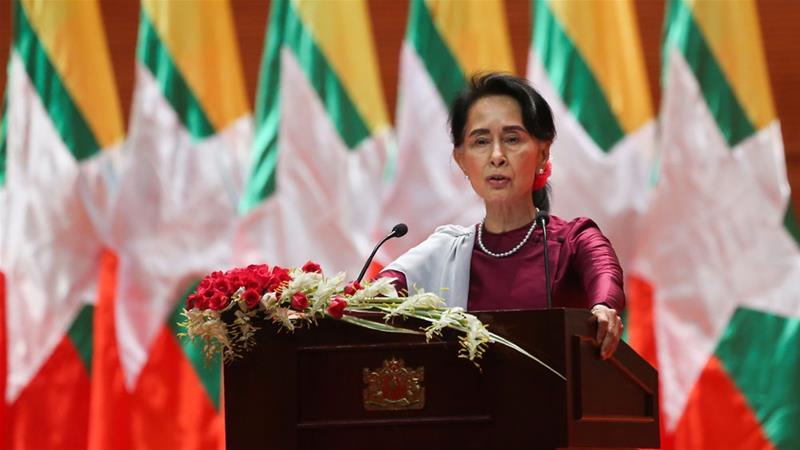Aung San Suu Kyi condemns ‘all human rights violations’

In her first comments on Rohingya crisis, Myanmar’s leader says she is ‘concerned’ over Muslims fleeing to Bangladesh.
Aung San Suu Kyi said she “feels deeply” for the suffering of “all people” caught up in conflict scorching through Rakhine state in her first comments on the crisis since the latest violence began last month.
“We are concerned to hear the number of Muslims fleeing areas to Bangladesh,” she said in a televised address on Tuesday, adding that Myanmar condemns any “human rights violations” that may have exacerbated the crisis.
Suu Kyi also said she was “concerned” over Muslims and others who have fled to neighbouring Bangladesh.
The Nobel Peace Prize laureate has come under increased criticism over the past month as more than 410,000 Rohingya have fled Myanmar to Bangladesh, escaping what the UN has described as “ethnic cleansing”.
Those who have fled have told stories of indiscriminate killings, rape, torture and arson by Myanmar security forces in Rakhine State, where the majority of Rohingya live.
On Monday, leaders from the UK, US, France, Canada and Australia had urged Aung San Suu Kyi to push for an end to violence against the Rohingya.
In her address, Aung San Suu Kyi said “it is not the intention of the Myanmar government to apportion blame or to abnegate responsibility”, adding that Myanmar does not fear “international scrutiny” over the Rohingya crisis.
She invited outside observers to visit Rakhine and see the problems in person.
“The security forces have been instructed to adhere strictly to the code of conduct in carrying out security operations, to exercise all due restraint and to full measures to avoid collateral damages and the harming of innocent civilians,” she said.
While Aung San Suu Kyi does not have control over the military, she had been criticised over her silence about the violence in Rakhine.
“Human rights violations and all other acts that impair stability and harmony and undermine the rule of law will be addressed with strict norms of justice, she said.
Verification process
Aung San Suu Kyi said that her country stood ready “at any time” to verify the status of the Rohingya who have fled violence in the last month to aid the return of those eligible for resettlement.
“We are prepared to start the verification process at any time,” she said referring to those who have fled in the unprecedented exodus to Bangladesh, without guaranteeing a return for all of the refugees.
It is not immediately clear how many of the estimated 410,000 Rohingya who have fled Myanmar would qualify to return.
Al Jazeera’s Scott Heidler, who attended the speech at Naypyidaw, said Suu Kyi “expressed good faith” in vowing to repatriate citizens of Myanmar from Bangladesh.
But he added that “the majority of the Rohingya are not treated as citizens in Myanmar and lack the proper documentation to begin with”.
“To prove they were from a certain village is going to be a monumental task.”
Al Jazeera’s Tanvir Chowdury, reporting from Cox’s Bazar, said Bangladesh has started a biometric registration process for Rohingya refugees.
But the repatriation process will be based on “trust and confidence in what Bangladesh’s government says”.
‘Shielding the military’
Speaking to Al Jazeera from Bangkok, James Gomez, Amnesty International’s regional director for Southeast Asia, expressed concern over what he called Aung San Suu Kyi’s “silence” on the abuses against the Rohingya.
“It almost came across that she was shielding the military,” Gomez said, adding: “What is the role of the military if she says there have been no attacks since September 5 in Rakhine state; then why is the burning going on?
“The issues of landmines on the border, incidences of disappearances of boys and men. Can we hold the military accountable? Is there going to be impunity?”
Gomez, however, said Aung San Suu Kyi’s invitation to diplomats and observers to enter Myanmar was a positive step, and called on her government to provide “unfettered and independent” access to UN investigators.
The latest round of violence in Myanmar began on August 25 after Rohingya fighters attacked more than 30 police and army posts, prompting a security crackdown on the Rohingya.
The mostly Muslim minority is not recognised as an ethnic group in Myanmar, despite having lived there for generations. Rohingya have been denied citizenship, which has effectively rendered them stateless.
AJ